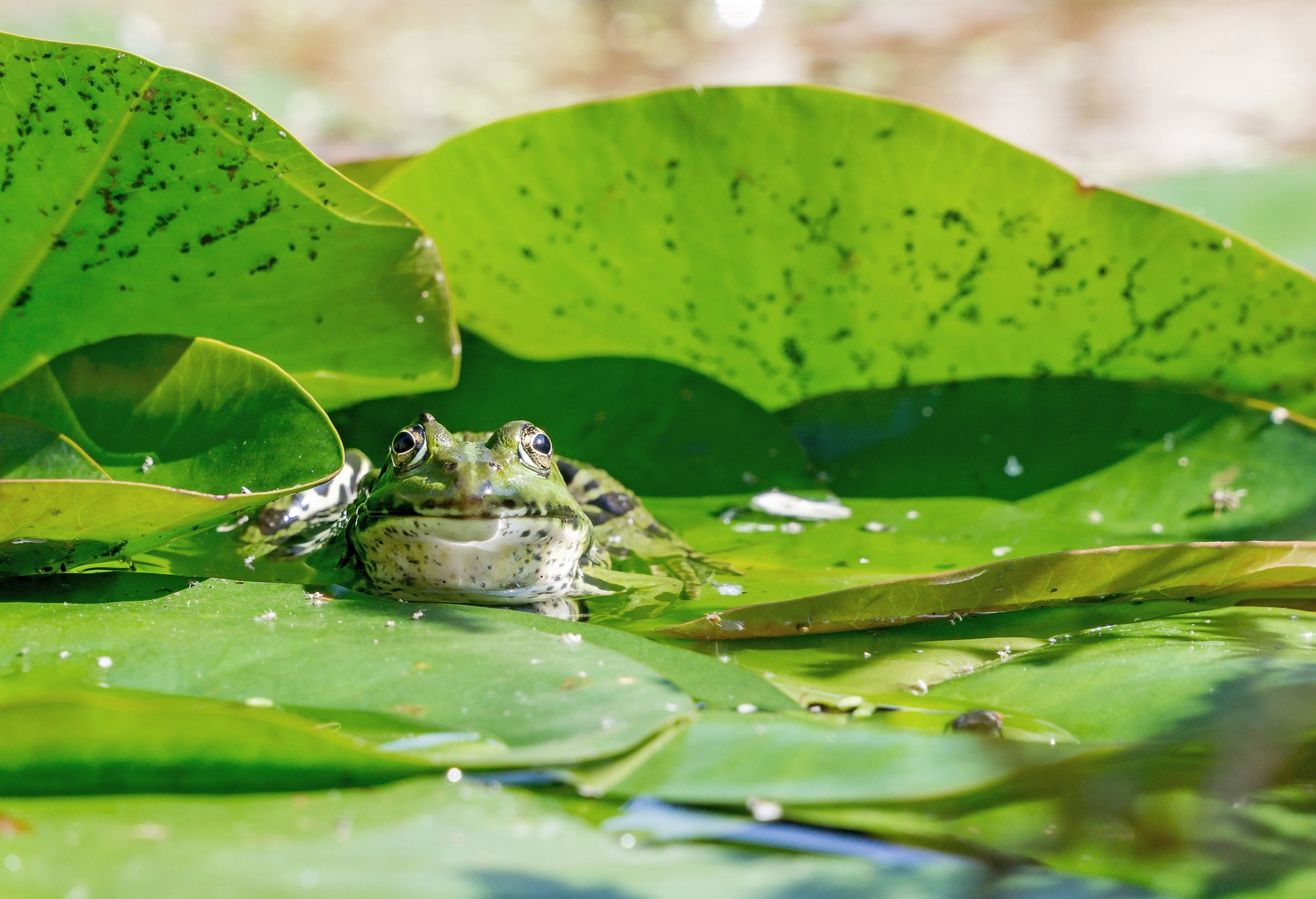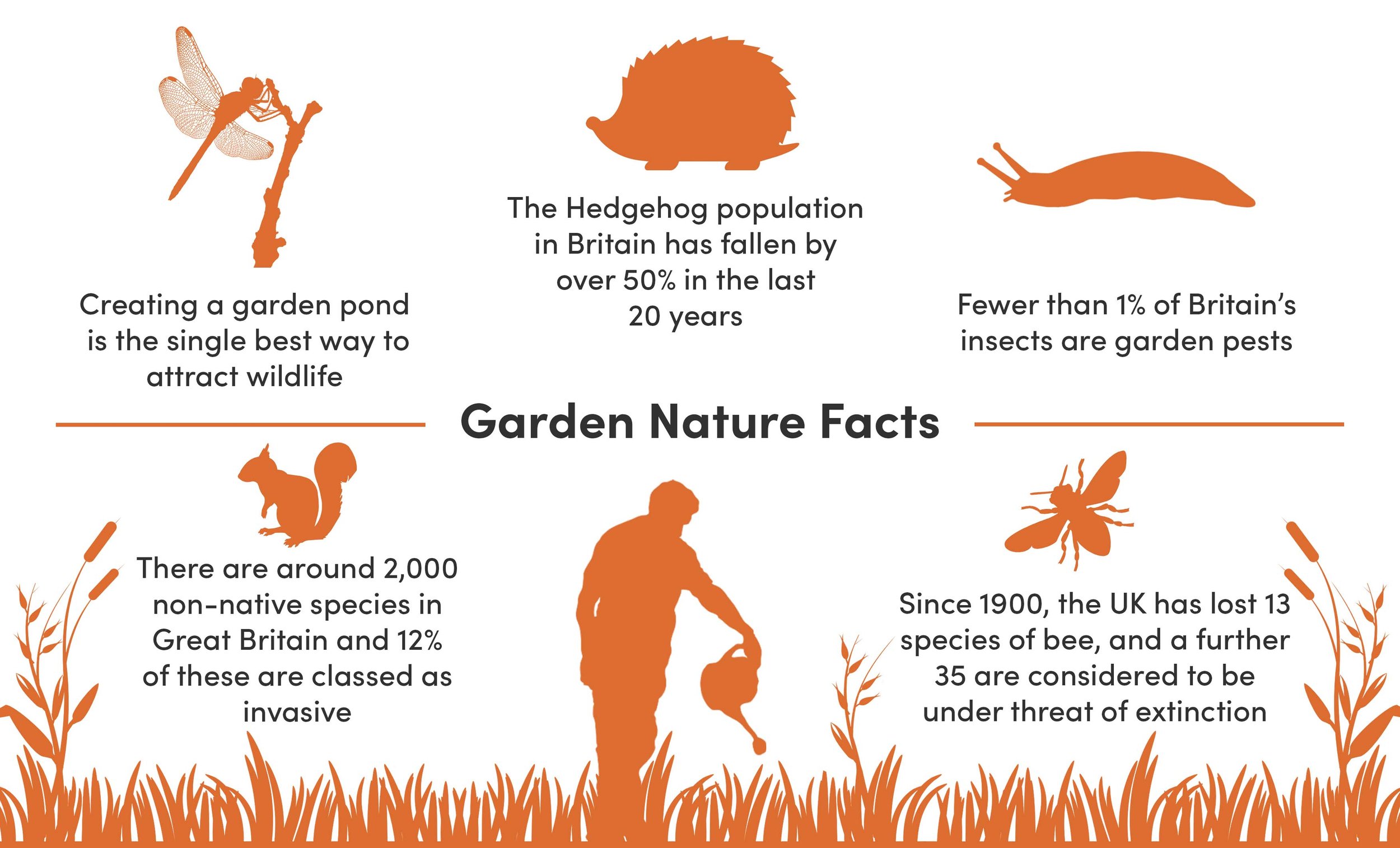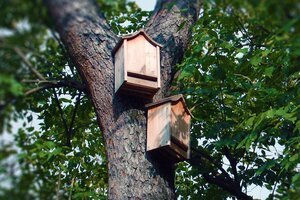
Wildlife Gardening
What Is The Problem?
The Facts
Since 1970, the world has witnessed a 68% decrease in wildlife populations.
Globally, 41% of insect species are in significant decline and 33% are endangered.
In the last 50 years, wildlife populations in the UK have declined by 41%, with butterflies and moth species some of the hardest hit.
As a result, 26% of UK Mammal species are now at risk of extinction.
20% of wild flower species in the UK are also under threat.
Keeping The Balance
The balance between humans and nature is critical to the survival of all species on our planet - flora and fauna. Every species has a role to play. However, within the last century, there has been significant disruption to this balance, with the sharp decreases in the populations of many species across the globe. This is a result of the intensification of agriculture, which is causing major disruption to forest and grassland habitats, and other factors such as urbanisation, climate change, and the use of pesticides.
Even the smallest of animals are integral to ecology; insects, for example, are an essential player in the food chain. Without these, many bird, reptiles, amphibian and fish species would go hungry. Perhaps one the biggest causes for concern is the decline in bee populations. In the UK, we have lost as much as 33% of our bee populations in the last decade alone. Bees are fundamental in keeping us alive; they are responsible for pollinating many different plant species, so are key in the production of much of the food we eat. Bees also help to pollinate wildflowers. Without this, many of these plants would not produce seeds, decreasing abundance and distribution. This has a knock-on impact on many complex food chains and affects the ecosystems of many other insect, bird and mammal species.
There have been some successes with as many as 26% of species increasing in abundance in the last 50 years. However, it is unclear what impact this will have given how stable populations had been up until recently. Ultimately, it is about striking the right balance and understanding how we can co-exist with nature.

Our Tip
Use natural alternatives to pesticides such as copper strips, sheep’s wool or egg shells to deter slugs.
How You Can Help
Unbeknown to us, our gardens are home to thousands of species of plants, insects, arachnids, birds, mammals, amphibians and reptiles; they provide some of the most diverse habitats in the UK. Thus, they are becoming increasingly important in the fight to save our wildlife.
A garden can provide a beautiful habitat, filled with a variety of ecosystems. Even the smallest or tidiest and most-symmetrical of gardens can provide a loving home. Creating a link between gardens also gives species space to migrate and allows populations to connect. Or, in the absence of a garden, a simple window box can provide many species with an area in which to thrive. Ensuring the needs of the wildlife are met is what matters most.
We have researched an array of methods and collated our top picks from different charities and organisations below. Each link provides some useful guidance to get you started.
Plant Your Ecosystem
Planting For Birds
Planting For Moths & Bats
Planting For Bugs
Planting For Bees
Planting For Butterflies
Whether you have a window box, allotment or large garden, please make sure to plant at least two kinds of bee-friendly flower for every flowering period (March to September) - these can be in shady areas or sunny areas. (E.g. wild strawberry, catmint, Lavender, Honeysuckle).
Build Your Ecosystem
Build A Bee Hotel
Build A Pond
Build A Hedgehog Home
Build A Bug Hotel
Grow A Wild Patch
Build A Bat Box
Protect Your Ecosystem
Pesticides:
Avoid metaldehyde.
Ensure your garden has as much variety as possible, so that no one species will be able to gain control. The more complex and varied your garden is, the more resilient it becomes.
Use natural alternatives such as copper strips, sheep wool or egg shells to deter slugs.
Create an environment that encourages predators like slow-worms or hedgehogs.
Other Useful Tips To Protect Your Ecosystem:
Conserving water - Use a water butt to catch large amounts of rainwater and use this to water your plants.
Don’t dismiss all weeds – a handful of nettles grown in a pot to stop them spreading, or tucked away in a corner, provide important food for butterflies.
Create your own compost - You will reduce your waste sent to landfill, you will be creating a habitat for minibeasts and you will be enriching the soil when dug in to your garden.

Our Tip
Use mulch and bark in your garden. It will help to reduce evaporation by up to 75% so plants need less watering.
Useful Symbols
Useful Links & Further Information
Click the title below for further information.
-
You can get even closer to your local wildlife by making your back garden a safe haven for nature. Here are nine things you can do in your garden to help birds, insects and animals.
-
A useful guide by the RSPB on how to encourage wildlife in to your garden.
-
The State of Nature Report presents an overview of how the country’s wildlife is faring, looking back over nearly 50 years of monitoring to see how nature has changed in the UK, its Crown Dependencies and Overseas Territories.
-
Don't just toss those little plant tags away. They contain some important information about the plants you just brought home.
-
This is an informative article written by ‘Flowers Across Melbourne’. It covers what to grow to attract different butterflies, how to start a butterfly garden from scratch, what the benefits are and also where to visit famous butterfly gardens around the world.
-
Roundup was a revolutionary new herbicide, or weed killer, when it hit the market in the 1970s. It and other pesticides that contain the active ingredient glyphosate are the most widely used herbicides in the world. Recent research has produced conflicting evidence as to whether these pesticides cause cancer in people exposed to them.
Roundup alternatives without glyphosate are available and can be effective. Organic brand options use naturally occurring oils or acids, and some alternatives can even be made with household ingredients. Farmers may find it easier to use different herbicides or farming methods.















